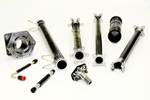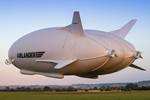Collins Aerospace acquires thermoplastic parts fabricator Dutch Thermoplastic Components
The acquisition underscores Collin’s commitment to deliver light, cost-efficient and sustainable aircraft structures.

Photo Credit: Collins Aerospace
On Nov. 17, Collins Aerospace (Charlotte, N.C.) announced the acquisition of Dutch Thermoplastic Components (DTC, Almere, Netherlands), a company that develops and fabricates structural thermoplastic composite parts. With this acquisition, Collins will expand the use of advanced thermoplastics to make aircraft lighter and more fuel-efficient.
According to Collins Aerospace, thermoplastic parts can be manufactured in minutes and the process can be easily automated, which makes thermoplastic composites an ideal material for high-rate aircraft production. Moreover, thermoplastics are lighter than conventional aircraft materials and require fewer fasteners, which further reduces weight and required maintenance.
"This acquisition underscores our commitment to use advanced materials and processes to address key areas of importance for our customers: weight reduction for fuel savings, reliability improvements and sustainable practices across the entire product lifecycle,” says Marc Duvall, president of aerostructures, Collins Aerospace.
“DTC was founded in 1998 with the production of the landing flap ribs of the Dornier 328 jet. Today, the company produces more than 2,000 part numbers for more than a dozen commercial and business aviation platforms,” says David Manten, managing director at DTC. “With this acquisition we are adding a new chapter to our story. Our team of driven and skilled experts are all excited to become part of the Collins family, and for the opportunity to leverage our technology, knowledge and experience for new and even more challenging projects that will help shape the future for commercial aerospace.”
Related Content
-
Airbus works to improve the life cycle of composites in future aircraft
This companion article to CW's September 2024 Airbus Illescas plant tour discusses recycling, LCA, biocomposites, Fast Track technologies, qualification and more.
-
Watch: A practical view of sustainability in composites product development
Markus Beer of Forward Engineering addresses definitions of sustainability, how to approach sustainability goals, the role of life cycle analysis (LCA) and social, environmental and governmental driving forces. Watch his “CW Tech Days: Sustainability” presentation.
-
European boatbuilders lead quest to build recyclable composite boats
Marine industry constituents are looking to take composite use one step further with the production of tough and recyclable recreational boats. Some are using new infusible thermoplastic resins.



